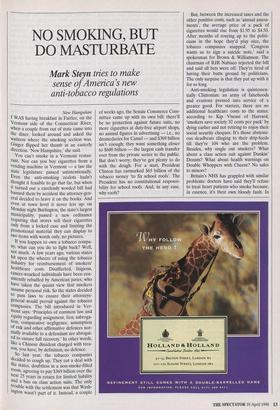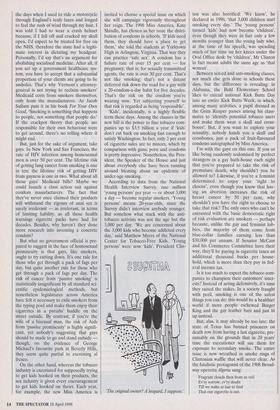NO SMOKING, BUT DO MASTURBATE
Mark Steyn tries to make
sense of America's new anti-tobacco regulations
New Hampshire I WAS having breakfast in Fairlee, on the Vermont side of the Connecticut River, when a couple from out of state came into the diner, looked around and asked the waitress where the smoking section was. Ginger flipped her thumb in an easterly direction. 'New Hampshire,' she said. You can't smoke in a Vermont restau- rant. Nor can you buy cigarettes from a vending machine in Vermont — a law the state legislature passed unintentionally. Even the anti-smoking zealots hadn't thought it feasible to go that far, but when it turned out a carelessly worded bill had banned them by accident the attorney-gen- eral decided to leave it on the books. And even at town level it never lets up: on Monday night Burlington, the state's largest municipality, passed a new ordinance requiring that stores sell their cigarettes only from a locked case and limiting the promotional material they can display to two items with words only, no pictures. If you happen to own a tobacco compa- ny, what can you do to fight back? Well, not much. A few years ago, various states hit upon the wheeze of suing the tobacco Industry for reimbursement of smokers' healthcare costs. Disaffected, litigious, cancer-wracked individuals have been con- sistently rebuffed by American juries, who have taken the quaint view that smokers assume personal risk. So the states decided to pass laws to ensure their attorneys- general would prevail against the tobacco companies. The bill introduced in Ver- mont says: 'Principles of common law and equity regarding assignment, lien, subroga- tion, comparative negligence, assumption of risk and other affirmative defences nor- mally available to a defendant are abrogat- ed to ensure full recovery.' In other words, like a Chinese dissident charged with trea- son, you have, by definition, no defence. So last year, the tobacco companies decided to cough up. They cut a deal with the states, doubtless in a non-smoke-filled room, agreeing to pay $369 billion over the next 25 years in return for limited liability and a ban on class action suits. The only trouble with the settlement was that Wash- ington wasn't part of it. Instead, a couple of weeks ago, the Senate Commerce Com- mittee came up with its own bill: there'll be no protection against future suits, no more cigarettes at duty-free airport shops, no animal figures in advertising — i.e., no dromedaries for Camel — and $369 billion isn't enough; they want something closer to $600 billion — the largest cash transfer ever from the private sector to the public. But don't worry; they've got plenty to do with the dough. For a start, President Clinton has earmarked $65 billion of the tobacco money 'to fix school roofs'. The President has no constitutional responsi- bility for school roofs. And, in any case, why roofs? But, between the increased taxes and the other punitive costs, such as 'annual assess- inents', the average price of a pack of cigarettes would rise from $1.95 to $4.50. After months of cosying up to the politi- cians in the hope they'd play nice, the tobacco companies snapped. 'Congress wants us to sign a suicide note,' said a spokesman for Brown & Williamson. The chairman of RJR Nabisco rejected the bill and said all bets were off. They're tired of having their butts ground by politicians. The only surprise is that they put up with it for so long.
Anti-smoking legislation is quintessen- tially Clintonian: an army of falsehoods and evasions pressed into service of a greater good. For starters, there are no additional healthcare costs to the states: according to Kip Viscusi of Harvard, `smokers save society 32 cents per pack' by dying earlier and not retiring to enjoy their social security cheques. It's those abstemi- ous deadbeats clinging to their drip-feeds till they're 104 who are the problem. Besides, why single out smokers? What about a class action suit against Dunkin' Donuts? What about health warnings on Double Whoppers with Cheese? No sales to minors?
Britain's NHS has grappled with similar problems: doctors have said they'll refuse to treat heart patients who smoke because, in essence, it's their own bloody fault. In the days when I used to ride a motorcycle through England's leafy lanes and longed to feel the rush of wind through my hair, I was told I had to wear a crash helmet because, if I fell off and cracked my skull open, I'd expect to be treated for free on the NHS, therefore the state had a legiti- mate interest in dictating my headgear. Personally, I'd say that's an argument for abolishing socialised medicine. After all, if you set up a government healthcare sys- tem, you have to accept that a substantial proportion of your clients are going to be assholes. That's why Vermont's attorney- general is not trying to reclaim smokers' Medicaid costs from smokers themselves, only from the manufacturers. As Jacob Sullum puts it in his book For Your Own Good, 'Smoking is something that happens to people, not something that people do.' If the crackpot theory that people are responsible for their own behaviour were to get around, there's no telling where it might end.
But, just for the sake of argument, take gays. In New York and San Francisco, the rate of HIV infection among homosexual men is over 50 per cent. The lifetime risk of getting lung cancer from smoking is one in ten; the lifetime risk of getting HIV from gayness is one in two. What about all those guys' Medicaid bills? Maybe we could launch a class action suit against condom manufacturers. The fact that they've never once claimed their products will withstand the rigours of anal sex is surely irrelevant — as irrelevant, in terms of limiting liability, as all those health warnings cigarette packs have had for decades. Besides, why haven't they done more research into inventing a concrete condom?
But what no government official is pre- pared to suggest in the face of homosexual promiscuity is that gays, like smokers, ought to try cutting down. It's one rule for those who get through a pack of fags per day, but quite another rule for those who get through a pack of fags per day. The risk of cancer from 'passive smoking' is statistically insignificant by all standard sci- entific epidemiological methods, but nonetheless legislatures across America have felt it necessary to exile smokers from the typing pool and make them enjoy their cigarettes in a pariahs' huddle on the street outside. By contrast, if you're the wife of a bisexual man, the risk of Aids from 'passive promiscuity' is highly signifi- cant, yet nobody's suggesting that gays should be made to go and stand outside though, on the evidence of George Michael's favourite park in Beverly Hills, they seem quite partial to exercising al fresco.
On the other hand, whereas the tobacco industry is excoriated for supposedly trying to get kids hooked on their products, the sex industry is given every encouragement to get kids hooked on theirs. Each year, for example, the new Miss America is invited to choose a special issue on which she will campaign vigorously throughout her reign. The 1998 Miss America, Kate Shindle, has chosen as her issue the distri- bution of condoms in schools. 'If kids need them, they should have a place to get them,' she told the students at Yorktown High in Arlington, Virginia. That way they can practice 'safe sex'. A condom has a failure rate of over 15 per cent — for pregnancy, that is; for sexually transmitted agents, the rate is over 30 per cent. That's not like smoking; that's not a distant deferred risk down the road for a guy with a 20-condom-a-day habit for five decades. That's the risk on the condom you're wearing now. Yet subjecting yourself to that risk is regarded as being 'responsible'.
`Kids', incidentally, is a highly flexible term these days. Among the clauses in the new bill is the power to fine tobacco com- panies up to $3.5 billion a year if 'kids' don't cut back on smoking fast enough to satisfy Washington. In fact, only 2 per cent of cigarette sales are to minors, which by comparison with guns, porn and condoms is pretty impressive. Nonetheless, the Pres- ident, the Speaker of the House and just about everybody else have been running around bleating about an epidemic of under-age smoking.
According to data from the National Health Interview Survey, one million `young persons' per year — or about 3,000 a day — become regular smokers. 'Young persons' means 20-year-olds, since the Survey didn't interview anybody younger. But somehow what stuck with the anti- tobacco activists was not the age but the 3,000 per day. 'We are concerned about the 3,000 kids who become addicted every day,' said Matthew Myers of the National Center for Tobacco-Free Kids. 'Young persons' were now 'kids'. President Clin- `The original owner? A leopard, I suppose.' ton was also horrified: 'We know', he declared in 1996, 'that 3,000 children start smoking every day.' The 'young persons' turned 'kids' had now become 'children', even though they were in fact only a few months younger than the young lady who, at the time of his speech, was spending much of her time on her knees under the Oval Office desk: by 'children', Mr Clinton in fact meant adults the same age as 'that woman'.
Between sex-ed and anti-smoking classes, not much else gets done in schools these days, but the difference is revealing: in Alabama, the Buhl Elementary School likes to extend national Kick Butts Day into an entire Kick Butts Week, in which, among many activities, a pupil dressed as the Grim Reaper passes among his class- mates to 'identify potential tobacco users and make them wear a skull and cross- bones'. But, if you want to explore your sexuality, nobody hands you a skull and crossbones, just a pack of fruit-flavoured condoms autographed by Miss America.
I'm with the gays on this one. If you so like being randomly sodomised by perfect strangers in a gay bath-house each night that you're prepared to take the risk of premature death, why shouldn't you be allowed to? Likewise, if you're a feminist determined to enjoy your 'right to choose', even though you know that hav- ing an abortion increases the risk of breast cancer by 50 per cent, why shouldn't you have the right to choose to take that risk? The only ones who can't be entrusted with the basic democratic right of risk evaluation are smokers — perhaps because, unlike the gay and feminist lob- bies, the majority of them come from blue-collar families earning less than $30,000 per annum. If Senator McCain and his Commerce Committee have their way, they'll be paying in cigarette taxes an additional thousand bucks per house- hold, which is more than they pay in fed- eral income tax.
Is it too much to expect the tobacco com- panies to champion their customers' inter- ests? Instead of acting defensively, it's time they raised the stakes. In a society fraught with peril, smoking is one of the safest things you can do: this would be a healthier world if more people eschewed Burger King and the gay leather bars and just lit up instead.
But, alas, it may already be too late: the state of Texas has banned prisoners on death row from having a last cigarette, pre- sumably on the grounds that in 20 years' time the executioner will sue them for exposure to secondary smoke. The entire issue is now wreathed in smoke rings of Clintonian waffle that will never clear. As the fatalistic protagonist of the 1908 Broad- way operetta Algeria sang: Fragrant clouds then from us veil
Ev'ry sorrow, ev'ry doubt Till we wake at last to find That our cigarette is out.



























































 Previous page
Previous page